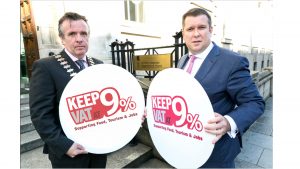Reduced VAT Rate Results In New Jobs In Offaly
- In Q1 2018 alone, 171,700 workers were employed directly in the Accommodation and Food Services sector and the total gross annual wage paid to those workers was €3.98 billion.
- In Q1 2018, it is estimated that 2,815 workers were employed directly in the Accommodation and Food Services sector in County Offaly.
- Total employment in the Accommodation and Food Services sector in County Offaly increased by 854 between Q2 2011 and Q1 2018.
- Indirect employment as a result of the change in direct employment in the sector is estimated at 393.
A recent report published by the Restaurant Association of Ireland (RAI) has revealed that 1,247 new jobs in the Accommodation and Food Services sector have been created in County Offaly since the introduction of the reduced VAT rate of 9% in July 2011. This report identifies the direct and indirect employment associated with the introduction of the reduced VAT rate of 9%. Between Q2 2011 and Q1 2018, the number of people working in the Accommodation & Food Services sector nationally increased by 54,400, taking total employment from 117,300 to 171,700 on a seasonally adjusted basis. The sector also accounted for 7.7% of total employment in the economy in the first quarter of 2018. At a national level, the increase in indirect employment as a result of the job creation in the Accommodation & Food Services sector is estimated at 25,024. The increase in direct and indirect employment is estimated at 79,424.
The Restaurants Association of Ireland today is urging Government to retain the 9% VAT rate for the tourism and hospitality industry as they believe it has improved the competitiveness of the sector, while ensuring the viability of many small businesses that have been going through challenging times. The RAI is asking Minister for Finance and Public Expenditure, Paschal Donohoe T.D, not to return the VAT rate to 13.5%.
In Q1 2018, it is estimated that 2,815 workers were employed directly in the Accommodation and Food Services sector in County Offaly. The total gross annual wage paid to those workers was €65 million. The total net annual wage paid to those workers was €57.8 million. The payroll taxes accruing to the Exchequer from this employment was €14.4 million. Indirect employment as a result of direct employment in the sector is estimated at 1,295.
Total employment in the Accommodation and Food Services sector in County Offaly increased by 854 between Q2 2011 and Q1 2018. The total gross annual wage paid to those extra workers is €19.8 million. The total net annual wage paid to those extra workers is €17.6 million. The payroll taxes accruing to the Exchequer from this extra employment is €4.4 million. Indirect employment as a result of the change in direct employment in the sector is estimated at 393.
Speaking about the success of the reduced VAT rate in recent years, Adrian Cummins, Chief Executive of the Restaurants Association of Ireland, said: “In terms of creating new jobs in the hospitality sector, the introduction of the 9% VAT rate in July 2011 has been a major driver of local employment growth. In Q1 2018 alone, 171,700 workers were employed directly in the Accommodation and Food Services sector and the total gross annual wage paid to those workers was €3.98 billion. Total employment in the Accommodation and Food Services sector has increased by 54,400 people between Q2 2011 and Q1 2018. The impact the reduced VAT rate has had on this growth cannot be underestimated.”
Due to this significant increase in employment in between Q2 2011 and Q1 2018, the total gross annual wage paid to those extra workers has amounted to €1,260 million. The total net annual wage paid to those extra workers is €1,118 million and the payroll taxes accruing to the Exchequer from this extra employment was €278 million.
There has been strong growth in the number of overseas trips to Ireland since the 9% VAT rate was introduced in July 2011. Between 2011 and 2017 there has been an increase of 52.7% in the number of overseas visitors to Ireland. This growth is due to a number of factors, but the impact that the reduced VAT rate has had on the competitiveness of the Irish tourism product is significant. This increase in visitor numbers, resulted in an increase of €1.97 billion in overseas tourist expenditure.
The 2018 report recognises tourism as Ireland’s most important indigenous sector, providing considerable employment across Ireland. In the context of a country where there is a strong imperative to boost employment and economic activity, the ongoing health of the sector is of vital importance. The RAI believe that the lower VAT rate is an important component of the tourism sector and the introduction of an increased VAT rate would only serve to undermine the competitiveness of the industry and the viability of many small businesses across Ireland.
